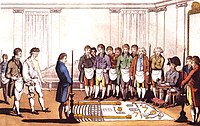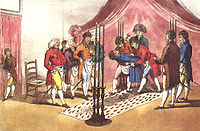User:JASpencer/Masonic ritual
Masonic ritual refers to the variety of scripted words and actions that have been spoken or performed by millions of people during the degree work in a Masonic Lodge. Each Masonic jurisdiction defines what is contained within its own ritual, and there are significant differences between the rituals of different jurisdictions.
Variety

Much like a play, Masonic degrees are conducted from memory, following a script. However, every Masonic jurisdiction is free to standardize (or not standardize) a ritual for its own use. Therefore, a standard ritual for all does not exist.
However, there are similarities in conceptual content among jurisdictions. For example, all Masonic ritual for the first three degrees makes use of the architectural symbolism of the tools of the medieval operative masons (meaning those who were stonemasons by trade). Freemasons, however, consider themselves to be speculative masons (philosophical rather than actual building), and use symbolism and allegory to teach moral and ethical lessons such as the four cardinal virtues of Fortitude, Prudence, Temperance and Justice, and the principles of "Brotherly Love, Relief, and Truth" (commonly found in English language rituals), or "Liberty, Equality, Fraternity" (commonly found in French rituals).
Degrees
These moral lessons are presented to the candidate through the performance of the ritual. The use of allegory is a common thread. A candidate progresses through three degrees:[1] Entered Apprentice, Fellowcraft, and Master Mason (thus, allegorically, passing through the stages of a working stonemason's career). With each degree, the candidate gains knowledge and understanding of himself, his relationship with others and his relationship with the Supreme Being (as per his own interpretation). While the philosophical aspects of Freemasonry are intended to be interpreted by each individual Mason for himself, to encourage the candidate to reflect on their possible meanings they are sometimes discussed in Lodges of Instruction or Research, or in informal groups within a lodge.
Freemasons, and others, frequently publish — to varying degrees of competence and acceptance — studies on these philosophical aspects that are available to the public. Any mason may speculate on the symbols and purpose of Freemasonry, and indeed all masons are required to some extent to speculate on Masonic meaning as a condition of advancing through the degrees. There is no one accepted meaning and no one person "speaks" for the whole of Freemasonry.[2]
Masonic ritual in Literature

There are a number of references to Masonic ritual in both literature and popular culture.
- In Tolstoy's War and Peace, Pierre Besouchoff joins the Freemasons, with his initiation into the Freemasons represented as being a turning point in his life[3]
- In Robert Heinlein's "If This Goes On—", the protagonists are initiated into the local Masonic lodge which leads the liberal underground[4]
- Rudyard Kipling's The Man Who Would Be King includes multiple references to and quotes from Masonic ritual. The protagonists of the story become "Kings of Kafiristan" through their knowledge of Masonic ritual.[5]
References
- ^
United Grand Lodge of England (2005) [1815]. "Aims and Relationships of the Craft". Constitutions of the Antient Fraternity of Free and Accepted Masons (pdf). London: Freemason's Hall. pp. pp. x–xii. OCLC 18976592. Retrieved 2007-05-08.
{{cite book}}:|pages=has extra text (help) - ^ Hodapp, Christopher. Freemasons for Dummies, Wiley, 2006. p.15
- ^ Freemasonry in War and Peace Grand Lodge of British Columbia and the Yukon
- ^ A Study of “IF THIS GOES ON—", 2000, Bill Patterson
- ^ Rudyard Kipling and Freemasonry, Paper by S P Thompson, reproduced on the website of the Grand Lodge of British Columbia and the Yukon
